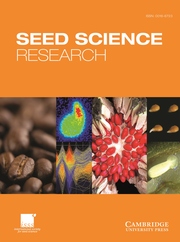Article contents
Xenia in bahiagrass: gene expression at initial seed formation
Published online by Cambridge University Press: 21 December 2018
Abstract
Xenia is the direct effect of pollen genotype on the development and characteristics of the seed and fruit in the period that spans from fertilization to seed germination. Xenia effects cause phenotypic variations in the seed and fruit, which have importance for seed and fruit production but are not heritable to the progeny. Two hypotheses have been proposed as a mechanism for xenia: the hormonal hypothesis and the mobile mRNAs hypothesis. Although xenia effects have been studied in seeds and fruits in many crops, its effects and mechanism have been poorly studied at the molecular level. The aim of this work was to perform an initial screening of the xenia effect in the hybrid endosperm at the molecular level by differential gene expression among different pollen genotype sources from Paspalum notatum Flüggé. In order to characterize xenia effects and mechanisms, crosses were made between an emasculated mother plant with donors from two different pollen genotypes. RNA was isolated from ovaries 3 h after pollination. Some of the 24 differentially expressed transcript-derived fragments (DETDFs) provided relevant information. Four of those DETDFs were related to germination, pollen tube growth and pollen–pistil interaction. Seven DETDFs were associated with seed development and production. Finally, four DETDFs were predicted to encode for mobile mRNAs. These DETDFs might be involved in xenia effects and mechanisms in P. notatum.
- Type
- Research Paper
- Information
- Copyright
- Copyright © Cambridge University Press 2018
References
- 9
- Cited by


